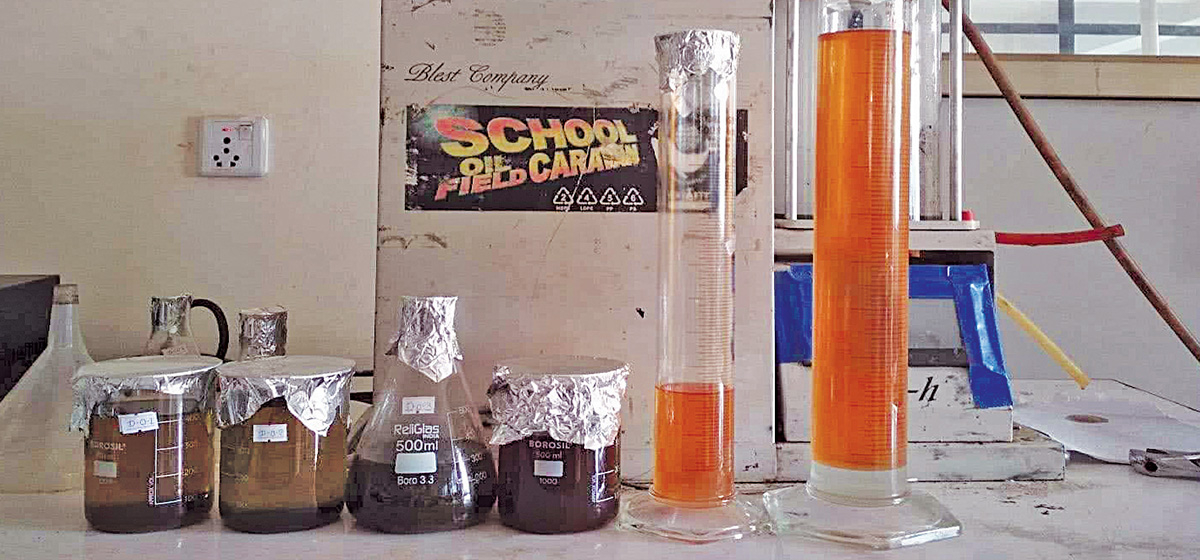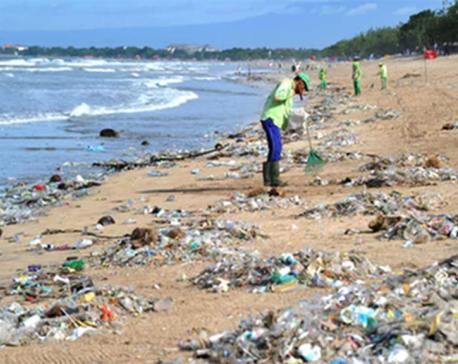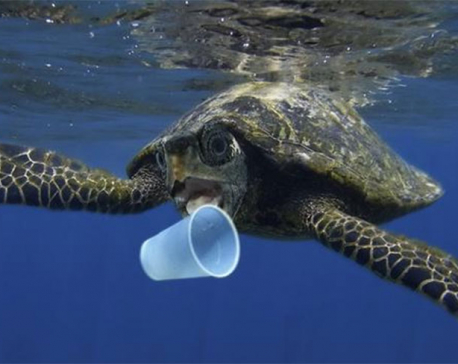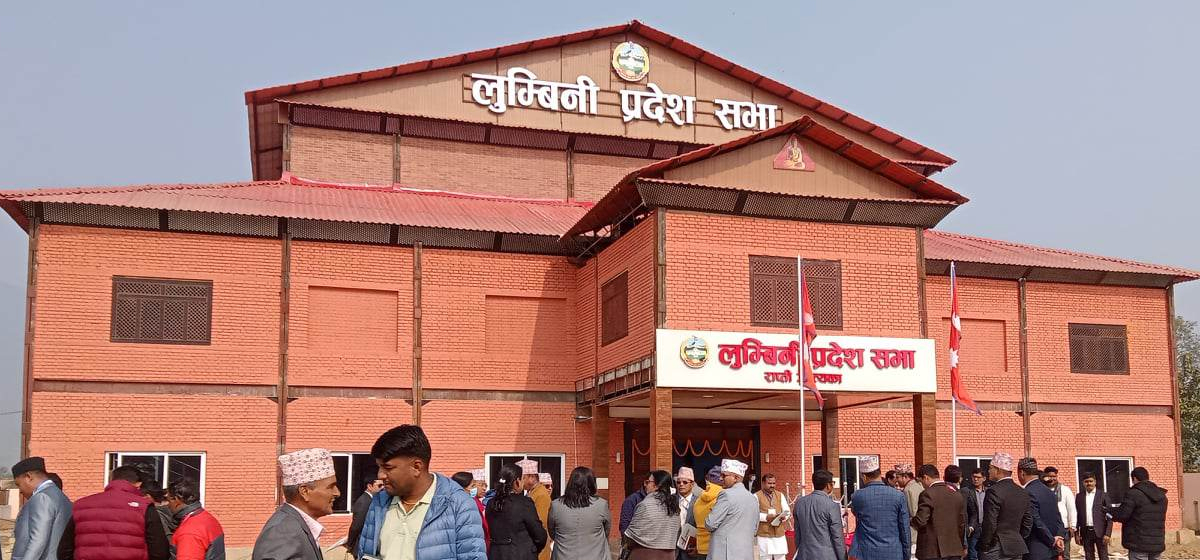
OR
Experts suggest producing fuel from waste plastic, jatropha, ethanol to tide over fuel crisis
Published On: July 7, 2022 01:45 PM NPT By: Ramesh Lamsal/ RSS

KATHMANDU, July 7: The per capita waste production per day in Nepal is 317 grams. This is mentioned in a report prepared in 2013 by the Waste Management and Processing Center with support from the Asian Development Bank (ADB). This figure has changed to some degrees in recent years. An individual produces half a kilo or 500 grams of waste a day. The proportion of plastic in this waste is 12 percent.
One thousand one hundred and forty metric tonnes of waste is generated in the Kathmandu Valley daily. Managing this waste has always been a headache for the Kathmandu Metropolitan City and the government authorities. Then there is the complaint of KMC high-handedness by people around the landfill site.
The streets in Kathmandu are littered with waste and are stinking for lack of proper waste management. On the other hand, millions of rupees are spent just for managing the waste. The waste can easily be turned into a source of making money if the government brings and implements a policy for the long-term management of waste.
Nepal Academy of Science and Technology (NAST) Senior Scientist Dr Rabindra Dhakal said that 342,000 liters of fuel can be produced from the plastic waste.
Nepal Oil Corporation (NOC), the state-owned petroleum importer and supplier, has said it is short of cash to import fuel. The price of petrol has reached Rs 181 per liter while that of diesel has touched Rs 172 per liter.
According to NAST senior scientists, 570 metric tonnes of the entire solid waste generated in the Kathmandu Valley can be processed to produce 342 kilolitres or 342,000 liters of fuel. "It is possible to produce petrol, diesel and kerosene by processing plastic waste. The environment also becomes clean. The fuel is produced at home and this saves our depleting foreign currency reserves as well," he asserted.
NAST had installed the system to produce fuel from plastic in 2016 itself. The then chief of NAST, Technology Faculty, Dr Suresh Kumar Dhungel and Chairman of the Eco Party Japan, Chiseko Matsumoto signed a bilateral MoU for producing fuel from plastic.
Although this technology was new for Nepal, it was in practice in the developed countries of the world. Works have been carried out at NAST regarding producing fuel using technology and equipment provided by Eco Party Japan. About a liter of crude fuel was produced from one kilogramme plastic through this technology initially installed at NAST. Currently, NAST has a machine that can process 10 kilograms of plastic.
As shared by Dr Dhakal, if the government invested in producing fuel from plastic waste, the country's foreign currency reserves can be saved.
"We are poor despite having the means and resources and gradually becoming dependent on import. Fuel can be produced from the plastic waste that is thrown in the streams or burnt," Dr Dhakal insisted and urged the government to work on this option without any delay.
Around one liter of raw fuel was produced from one kilo of plastic using the technology during a trial run in 2016. Dhakal, said that they are very happy to bring the technology producing fuel from plastic into the country.
NAST has set a target to bring the large capacity technology producing fuel from plastic into the country within one month.
Dhungel said, “All required processes have been forwarded. We will install the technology within a month.” Normally, 700 milliliters of petrol is produced from one kg plastic.
Stating that a lab would be set up on NAST premises within the next 45 days, Dhakal said that South Africa, America, Canada and other countries produce fuel from plastic waste on a commercial scale.
Although it has been many years since the technology producing fuel from plastic was introduced in Nepal, works to that end have not progressed. The topic of producing fuel from plastic gets prominence when there is obstruction at the border and import of fuel is stopped, it is forgotten once the import of fuel eases.
The impact of the conflict between Russia and Ukraine has been felt in Nepal also at present. Fuel import is also one of the main reasons for the depletion of the foreign currency reserves. As per the statistics shared by NOC, fuel worth more than Rs 250 billion has been imported in the 11 months of the current fiscal year alone.
The graph of inflation is climbing up in the country with the rising fuel prices in the international market. An increase in the price of fuel has a snowball effect in every sector of the economy. The chances of inflation reaching a double-digit figure have increased although the government has said it will limit inflation around seven percent.
The government should wake up and pay attention to alleviate the fuel crisis to some extent by processing the waste plastic. It is said 700 milliliters of petrol can be produced from one kilogramme plastic. Dr Dhakal, the NAST scientist said that 700 milliliters crude fuel can be produced by processing a kilogramme of the normal water bottle while up to 800 milliliters can be produced by using the lid of the same plastic water bottle.
As he said the quality and quantity of the plastic determines the volume of fuel that can be produced from it.
Dr Dhakal said that this technology has been successfully used by developed countries such as Japan, America, and Canada etc. He believed that the private sector could also invest in this technology if the government supported it. ADB has already said it is interested in investing in the technology. Dr Dhakal suggests that the government should start a model project on this.
"Daily more than 300,000 liters of fuel can be produced in the country by processing the plastic waste generated in the Kathmandu Valley and other big cities like Biratnagar, Birgunj, Narayanghat, Pokhara, Dang, Nepalgunj, Dhangadhi and Mahendranagar, among others," he said.
According to him, fuel required for Nepal can be produced from the waste itself. The Ministry of Industry, Commerce and Supplies and the Ministry of Energy should work in this sector by giving special interest.
Not only diesel can be extracted from plastic, furnace oil can also be derived from it by means of various types of chemical reactions.
‘Let’s plant jatropha trees in uncultivable land’
Dr Dhakal also suggested planting jatropha trees in fallow land for substituting the import of fuel. Bio-fuel can be produced from the jatropha plant seeds. In his view, bio-fuel can be produced to meet the national demand for fuel if only jatropha trees can be planted on both sides of the highways.
Senior agriculture officer Kul Prasad Subedi said jatropha can be successfully grown in the Terai region from Jhapa in the east to Kanchanpur in the west. Jatropha cultivation can be expanded on the lower base of the Mahabharata range as well as in the Bhawar region.
According to experts, non-edible oil equivalent to 38.5 percent can be extracted from the jatropha fruit. This oil can be mixed up to 40 percent with diesel and used to power machinery, factories, vehicles, tractors etc.
Forty liters of bio-fuel can be produced from seeds collected from jatropha trees cultivated in one ropani area. This means that 4,000,000 liters of bio-fuel can be produced by planting jatropha trees in 100,000 ropanis of land.
Ethanol as fuel
Dr Dhakal suggested another alternative source of fuel. He said ethanol can be used as an alternative to fuel. He viewed that ethanol can be produced easily in sugar factories within the country. Ethanol can be produced from the residues that come as the by-product at sugar mills after producing sugar and molasses.
According to him, 200 thousand kilolitres equivalent of fuel can be manufactured if five to 10 percent of the biodiesel and ethanol is readily mixed. In this way, we can save Rs 20 billion within the country annually.
You May Like This

'Plastic, plastic, plastic': British diver films sea of rubbish off Bali
Video posted on YouTube shows water densely strewn with food wrappers, cups and sachets as tropical fish dart in and... Read More...

Marine plastic: Hundreds of fragments in dead seabirds
June 23: Seabirds are starving to death on the remote Lord Howe Island, a crew filming for the BBC One... Read More...

Efforts to enforce ban on plastic bags to resume
KATHMANDU, JULY 18: The government has yet again vowed to strictly enforce the ban on plastic bags. ... Read More...


Just In
- Resignation of JSP minister rejected in Lumbini province
- Russia warns NATO nuclear facilities in Poland could become military target
- 16th Five Year Plan: Govt unveils 40 goals for prosperity (with full list)
- SC hearing on fake Bhutanese refugees case involving ex-deputy PM Rayamajhi today
- Clash erupts between police and agitating locals in Dhanusha, nine tear gas shells fired
- Abducted Mishra rescued after eight hours, six arrested
- Forest fire destroys 13 houses in Khotang
- First meeting of Nepal-China aid projects concludes















Leave A Comment